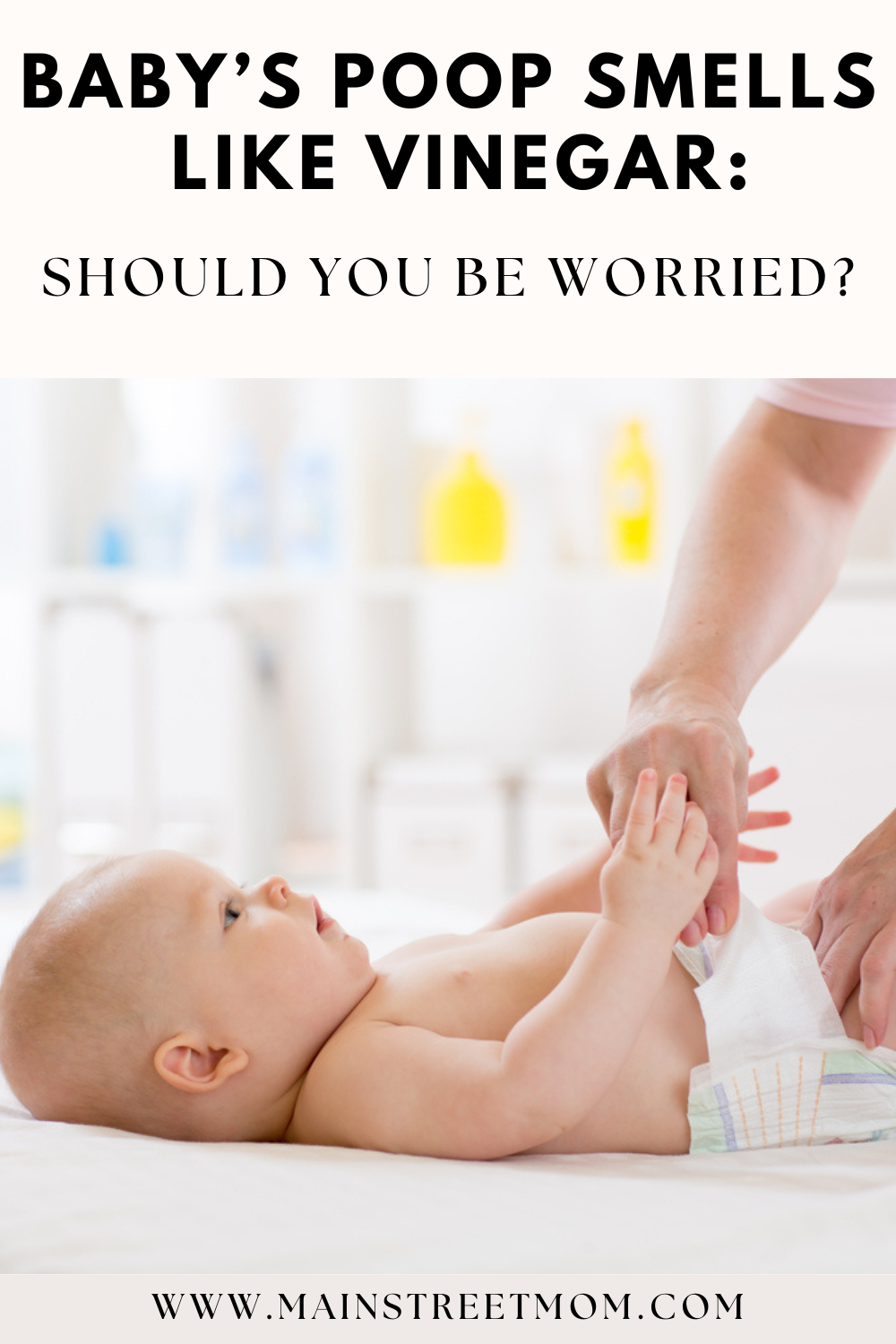Checking your baby’s poop becomes a regular thing for every parent. It’s a good way to check your baby’s health and whether she has any reactions to new foods she might have tried. But what does it mean when your baby’s poop smells like vinegar?
For the first few months, your baby’s poop might change on a daily basis, and that’s completely normal. However, it’s important to monitor her stool, as it will help you determine whether your baby is eating enough, or you have to start feeding her more.
If your baby is breastfed, her regular poop might smell a bit sweet and be yellowish in color, with a soft and runnier or seedy texture. This means she’s perfectly healthy and getting enough food! A healthy, formula-fed baby, will have poops that are a bit smellier, darker, and have a mousse-like texture.
However, every time you change your baby’s diet, it will show in her stool, which might be the reason why there’s this sour smell coming out of your baby’s diaper. If that’s the case, there’s probably nothing for you to worry about. Just to be sure, we recommend you reach out to your doctor for professional advice.
Unfortunately, poop that smells like vinegar could also be an indicator of some underlying health conditions. Together, we’ll go through some of the most common reasons why this happens. Don’t worry, most of them aren’t serious, but it’s still good to rule out any possible health-related issues.
Baby’s poop smells like vinegar – 8 potential reasons why

As we’ve previously said, one of the best ways to track your baby’s health and eating habits is by monitoring her poop. Its smell, consistency, and color will tell you if your little one’s body is dealing with any issues that need your, or medical attention.
Babies’ food usually smells sweet if it’s breastfed, or has no odor at all. If you notice any changes in the way it smell, you might want to pay more attention to it. There could be many reasons why this happens.
Although most of them are not a cause for concern, it could also mean that your baby is dealing with some health issues. Before we get to all the potential causes, we recommend you don’t deal with this on your own. The best thing you could do is pay a visit to the doctor to make sure your baby is healthy.
1. Lactose intolerance
If your baby’s poop smells like vinegar, she might be lactose intolerant. Because lactose intolerance affects the whole digestive tract, it could also affect your little one’s bowel movements.
Babies’ poop usually starts smelling sour when they’re unable to digest dairy products. If this is the case, you should stop feeding your baby formula right away. Unfortunately, even breastfed babies can have this condition.
If your baby is only drinking milk, then lactose intolerance could be the reason for the weird odor. When babies suffer from this condition, besides the sour smell, they also get a watery stool, bloating, and gas.
If you suspect this might be the case, you should speak to your doctor about milk alternatives that won’t harm your little one.
2. Nutrient malabsorption

If your baby’s body has difficulties absorbing vitamins, sugars, nutrients, and protein, she is dealing with malabsorption. It happens in case your baby’s digestive system didn’t develop properly, so she’s not able to digest the nutrition that her body requires.
The underdeveloped digestive system isn’t the only cause of this, and many parasites, viruses, and even genetics can lead to malabsorption. With this condition, it’s common that baby’s poop smells like vinegar, and it should be the first symptom you mention to your doctor.
3. Possible allergies
Once your baby is old enough to move to solid foods, you should be careful every time you introduce something new to her. Make sure you’re patient, give your baby fresh food, and monitor her for a couple of days for any possible allergic reactions.
This is the period when you’ll be able to discover any food allergies or intolerance your baby might have. Never introduce more than one new food to your little one, so you can know what caused possible reactions.
When introducing solid foods, it’s normal that your baby’s poop changes color, consistency, and smell depending on what she ate previously. If you notice your baby’s poop smells like vinegar, there’s a high chance you gave her something she’s not able to digest.
Before you start introducing your baby to new foods, make sure you do your research and talk to your doctor first, so you know how to do it properly. They’ll tell you everything, from what food your baby is ready to try, to how long you should wait before introducing something new.
4. Imbalance of her gut microflora

Through vaginal delivery, your baby receives all the good gut bacteria. It’s called microflora and helps your child’s digestive system.
But this won’t happen if a baby’s born by C-section. In that case, she may experience an imbalance in her own digestive system which then can lead to poop smelling like vinegar.
5. Your baby might not be digesting her food well
If your baby’s having tummy issues and she’s not able to digest her food properly, you might notice a change in her stool. When this happens, your little one might not be able to pass gas, which causes bloating and pain, leading to constipation. The stool that manages to pass, might smell sour.
There could be many causes of bad digestion, including infection, lactose intolerance, stomach bugs, and fever. You shouldn’t rule out any of these conditions by yourself, so it would be best to pay a visit to your pediatrician.
You should never ignore your little one’s digestive issues as they can be pretty uncomfortable.
6. Teething
When teething, your baby goes through a lot of changes, and most of them are pretty uncomfortable. It’s not uncommon for babies’ poop to change when this period begins, and sometimes it can even smell like vinegar.
Although there’s no scientifically proven reason why this happens, the changes in your baby’s poop are normal. Besides the sour smell, she might also have diarrhea and other changes in her stool.
7. Crohn’s disease

Unfortunately, when a baby’s poop smells like vinegar, it could be a symptom of Crohn’s disease. This disease can be harmful to your little one’s health, so never take the symptoms lightly.
Crohn’s disease in babies manifests in diarrhea or watery stools that smell sour. On top of that, a baby who suffers from this condition will also be prone to malabsorption and microflora imbalances, which cause poop to smell like vinegar.
Babies who are breastfed are less likely to suffer from this disease. If your little one’s been having diarrhea for a few days now, make sure you take her to the doctor right away. Excessive stools can make your baby weak, dehydrated, and prone to other diseases.
8. Other health-related issues
Rotavirus is another health-related issue that causes a baby’s poop to smell like vinegar. On top of this symptom, your baby might also experience vomiting, fever, diarrhea, and dehydration.
Besides rotavirus, your baby might have a blockage in her digestive tract caused by cystic fibrosis. This condition causes mucus and juices to thicken, which results in your baby’s digestive tract struggling to absorb nutrients.
What to do if your baby’s poop smells like vinegar?

The first thing you should always do when you notice any changes relating to your baby’s health is to visit the doctor right away. No matter how much you want to do it, don’t try to help your little one on your own. Your doctor will tell you everything you need to know about how to help your baby.
Before your doctor tells you what to do, you can make some slight changes and see if it helps. For example, if the vinegar-smelling poop is the only symptom your baby is showing and it only lasts for a couple of days, you can try making some changes in her diet.
If you’re lucky, that will solve the issue without the need for any special medical attention. However, if your baby shows other symptoms such as fever, vomiting, loose stool, abdominal pain, crying, shortness of breath, or blood in her stool, don’t hesitate to seek medical care.
In case it turns out that your baby is lactose intolerant, don’t worry. There are lactose-free formulas that your pediatrician will recommend. If you decide to try them, make sure you monitor your baby’s poop for any changes. If it continues to smell sour, seek medical attention.
Rotavirus infections are also easily treatable, and your pediatrician will help you understand how you can help your little one. The most important thing you can do is keep her hydrated, as she will probably show symptoms such as vomiting and diarrhea.
All in all, the best thing you can do is consult your pediatrician. From there, they’ll help you understand what your baby is going through, and how you can help her.

